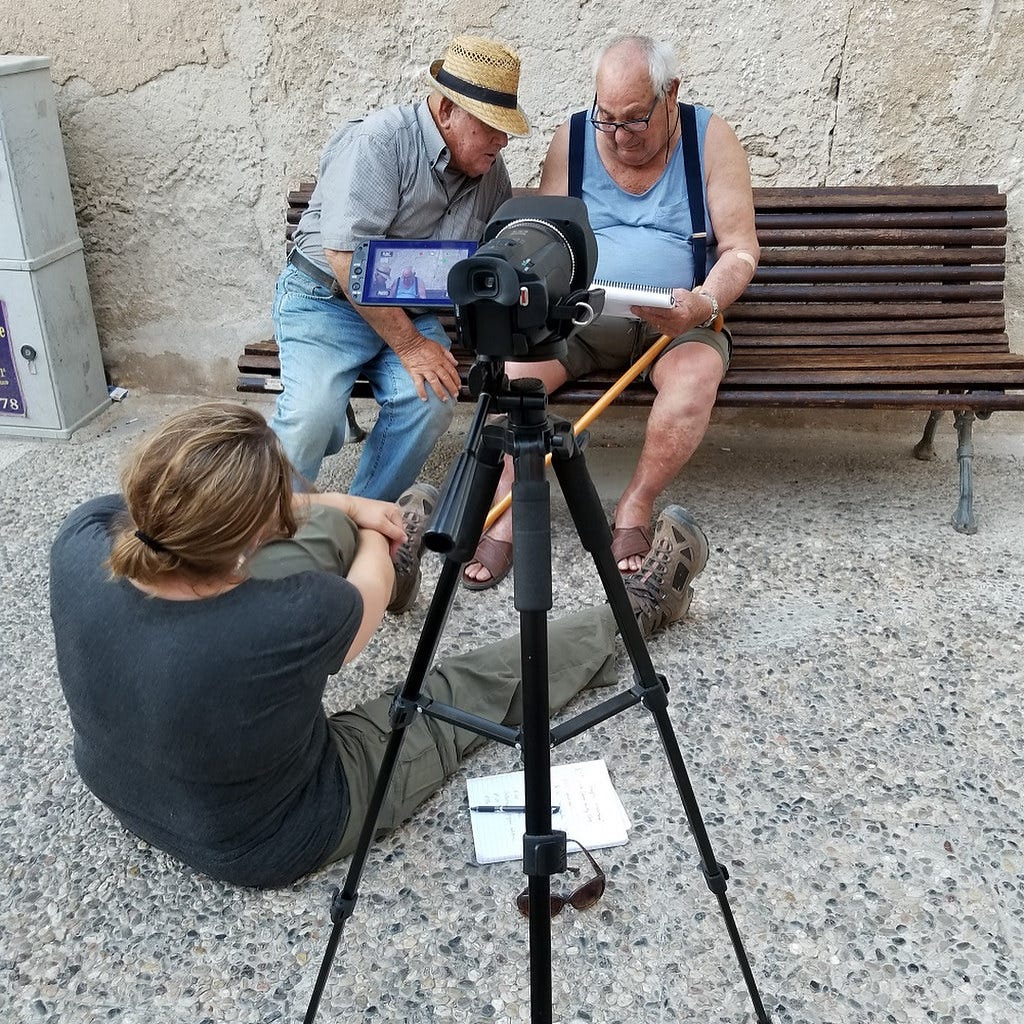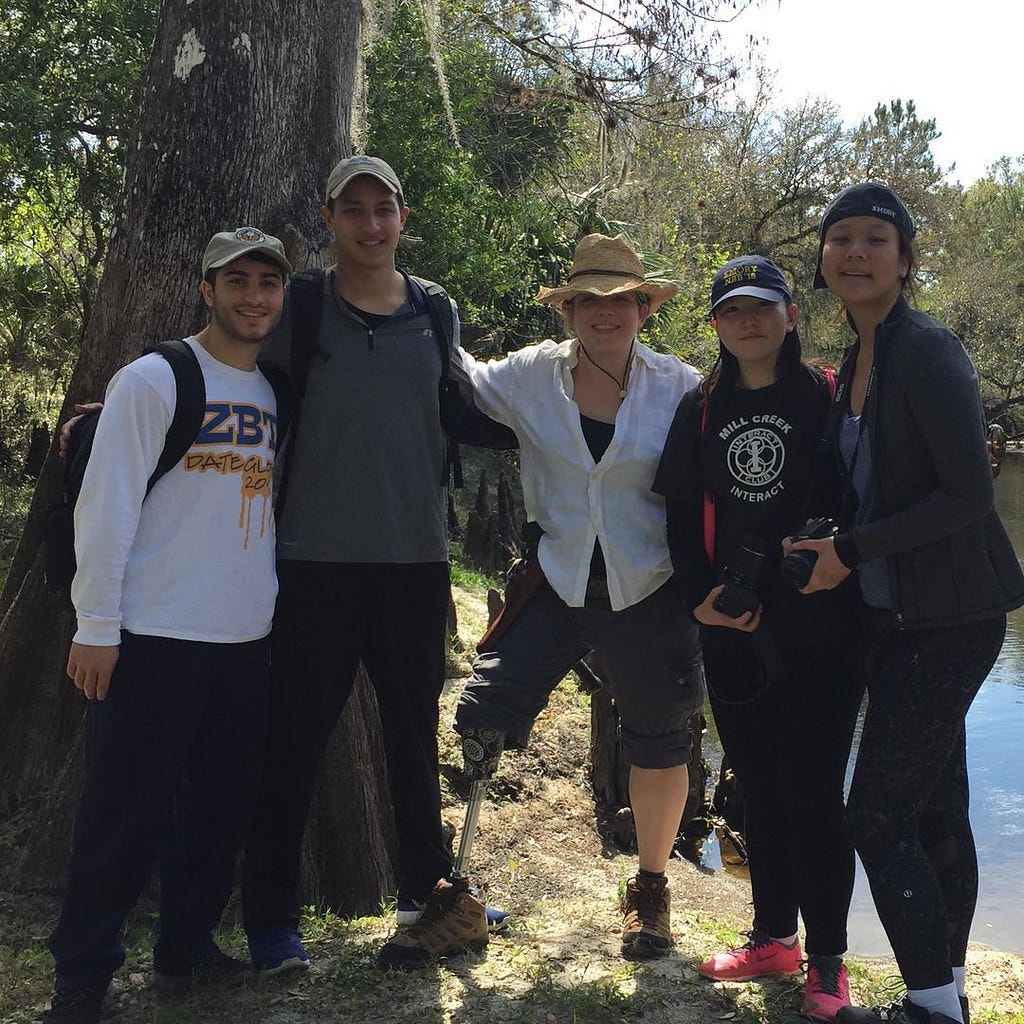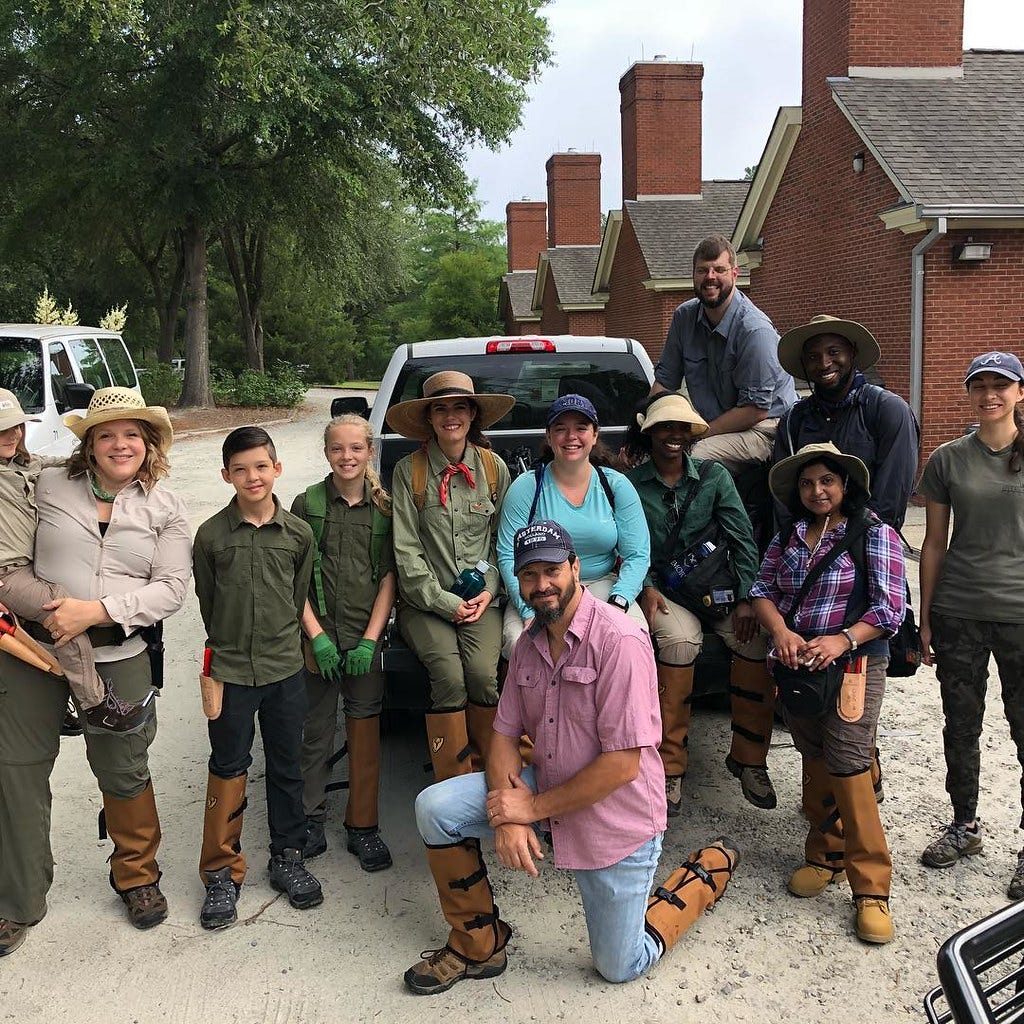Oh, baby! Fieldwork with family...and a fake leg
I reflect on some lessons learned from my years in scientific field research.
Yesterday, I had the pleasure of visiting with some very special women who, nearly 20 years ago, made my dreams of graduate field research a reality. I was one of several Botany in Action fellows, supported by the Garden Club of Allegheny County (Pittsburgh, PA). Today, this special program is managed by Phipps Conservatory and Botanical Gardens.
I came back to the Garden Club to share updates on my research and thank them for their support all those years ago. Programs like this one fill a unique gap in the scientific research enterprise as the opportunities for funds to cover even the most basic costs of a plane ticket, local housing, and food during an expedition can be hard to come by.
During my lecture, I shared some of the highs and lows of scientific research, including insights into the realities of the challenges of doing fieldwork as both a mother and a person who is mobility impaired. The feedback I got from the group is that it is important to showcase the challenges and the paths I found to solutions. The resilience! Examples of resilience can inspire others. On my flight home last night I pondered how to share this story with you, dear readers. Then, I recalled an article I’d written on this subject, entitled “Fieldwork with Family…and a Fake Leg” for the newsletter of the American Society of Pharmacognosy back in 2018. Here’s an edited version of that original piece. I hope you enjoy it.
My husband, Marco, and I welcomed our first of three children in the fall of 2005. I was a graduate student at Florida International University in Miami, FL at the time, and finished my qualifying exams for PhD candidacy just a few weeks shy of my due date. This was not an easy thing. Like most of my peers, I had been hooked on some of the best alkaloids (caffeine and nicotine) and was denied that stimulant boost while prepping for my qualifying exams. Not a fun time for me, but Marco and I were overjoyed to greet Donato, our first addition to the family.
Just five short months after giving birth, I would be on a plane with our new addition—Marco staying behind in Miami for his job—as I embarked on my doctoral fieldwork project that would keep Donato and me away from home and from Marco for the next seven months. Our destination was the rural center of southern Italy in the Basilicata province where Marco and I had met years before. I had the connections of both family to help with childcare and established field sites in a number of villages across the Vulture Alto Bradano region.
Today, as a medical ethnobotanist and pharmacognosist, I seek out medicinal plants in my drug discovery lab research program. I currently have over 750 species and 2,500 extracts (plus hundreds of fractions) in my customized collection of plant-derived chemicals, the Quave Natural Products Library. An active collection program is key to the expansion of the library; I personally collect or direct field collections of all species that we work on in the lab. Over the past 20 years, my field research sites have included the flooded forests of the Peruvian Amazon, rural agricultural villages of central Italy, isolated island chains in the Mediterranean, desert oases of north Africa, rugged mountain peaks in Albania and Kosovo, gator-infested swamplands of south Florida, and the rattlesnake territory of the Georgia pinelands.

Field research is many things for me. It is fun and exciting, but, at the same time, physically and mentally challenging. In addition to the physical rigors of collecting and processing kilos of plants in the sweltering heat or bitter cold, I also spend part of my days interviewing people about traditional uses of those plants—and often in a different language. By the end of the day, my head is a jumble of words in Italian, Spanish or even Albanian as well as Latin from keying out and recording all of the plant names.

Working in the field as an amputee with a below knee prosthesis has especially thrown some hurdles my way. Injury to my good leg would be disastrous. As for my stump, I have to remain vigilant in wiping the excess sweat from it on long walks to keep it clean and reduce the risk of heat rash and infection. My first field experience as an undergraduate student in the Peruvian Amazon taught me that lesson well. On the third day of long walks down jungle paths, I developed a large boil in the crease under my knee where my prosthetic had rubbed the skin raw in the heat. It left me immobilized for nearly a week because I couldn't wear the prosthetic and I didn't have crutches with me. Luckily, the boil cleared with standard wound care, and I didn't develop a more serious infection or need for IV antibiotics, which had happened before. From that day on, I traveled by canoe or motorboat whenever I could for longer distances.
Most days in the field my body is bruised and battered from just the process of getting to the plants I seek. Whenever possible, I try to incorporate alternative modes of transportation to get me as close to my collection spots as possible, be it by canoe, truck, airboat or donkey. These days are long, meant to maximize the precious time I have to work at a site. Having students and trainees along certainly makes things easier too—now they can scramble up the hill to grab the species we seek.

When my children were infants and toddlers, I'd often bring them along in a stroller with me to interviews. The elderly people that I spent the most time interviewing loved to dote on them and give them cookies and sweets as we chatted. As they've grown older, my kids see these times as the idyllic days of summer, spent playing soccer and running free in the small villages we visit for work or joining the field team armed with clippers and collection bags. On the days spent near the village, I never have to worry about where they are throughout the day; the tightknit network of village grannies gives me an update on their location about every 30 minutes or so. It is just as effective as using a tracking device! Marco and I took turns watching our youngest child, who at five required more supervision than the 11 and 13 year-olds.

Why include my family in fieldwork? In some ways, my answer is simple; in others, it is not. Family is incredibly important to me and, unfortunately, the life of a Pl, or lab leader, requires that I already spend too much time away from my husband and kids, and that is when I am in town, living with them at home! Field research often requires weeks to months away, and to maximize this time I often plan my field seasons in the summer, while I am not teaching and the kids are not in school. One simple answer is that I cannot bear to be away from them for that long. Another answer is that I want this to be an opportunity to enrich their lives through exposure to different languages and culture. This does not come without extra expenses though. Family expenses are not considered a part of the research budget; we have had to put many of our personal financial and airline miles savings into making this possible. While my airline tickets are covered, those of my husband and kids (who all pay full fare) are not and can amount to several thousand dollars each summer.

The major lesson that I have learned from my time in the field when it comes to family and accessibility is simple: anything is possible with a bit of creativity and perseverance, but there is no "one size fits all" solution for these logistics. Every scientist has different family dynamics and different personal physical abilities and disabilities. My advice is to plan your expeditions carefully, taking these factors into consideration as you work out logistics with team members and collaborators. Clear communication regarding expectations is crucial, and this spills over into the budget planning. Whether it is an off-road truck, an airboat or a team of donkeys you need to rent to access your collection sites, be sure to account for those additional expenses in your budget.
Fieldwork is one of the highlights of my career in science. I relish the opportunities to travel and experience nature through the lens of different cultures. The excitement of uncovering the mystery of how a medicinal plant works in our lab models, or the thrill of discovering which compounds are responsible for the medical benefits of the traditional therapy, verge on addictive for me. My goal moving forward is to see projects go from the field to the lab, and then someday, onto pharmacy shelves.
Yours in health, Dr. Quave
Cassandra L. Quave, Ph.D. is a scientist, author, speaker, podcast host, wife, mother, explorer, and professor at Emory University School of Medicine. She teaches college courses and leads a group of research scientists studying medicinal plants to find new life-saving drugs from nature. She hosts the Foodie Pharmacology podcast and writes the Nature’s Pharmacy newsletter to share the science behind natural medicines. To support her effort, consider a paid or founding subscription, with founding members receiving an autographed 1st edition hardcover copy of her book, The Plant Hunter.
Available in hardcover, paperback, audio, and e-book formats!






